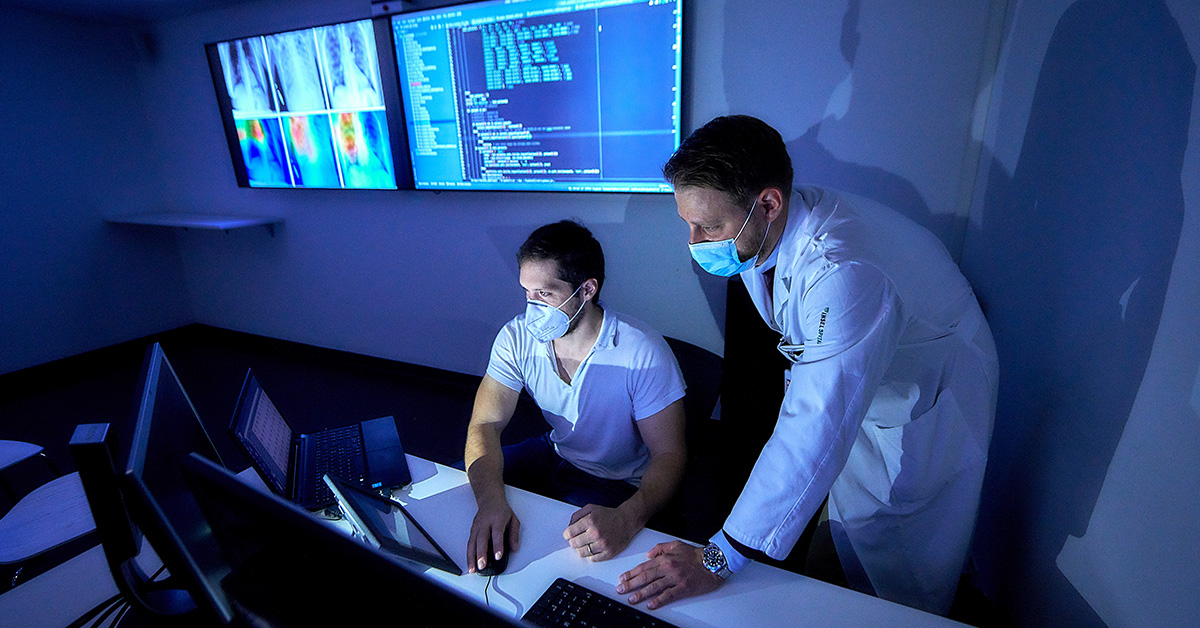2020/12/11 | Media | Artificial Intelligence
AI X-ray analysis detects Covid-19 more reliably
A team of researchers at Inselspital, Bern University Hospital, and the ARTORG Center for Biomedical Research at the University of Bern has developed a new chest radiography image analysis for the detection of COVID-19. The researchers compared this artificial intelligence (AI) with standard, diagnostic annotation by radiologists. Especially for distinguishing COVID-19 from non-COVID-19 lung disease, AI provided significantly more reliable results.
 PhD fellow Matthias Fontanellaz, research engineer AI in Health and Nutrition Lab, ARTORG Center, University of Bern, and Prof. Dr. med. Lukas Ebner, Section Chief Thoracic Imaging at Inselspital, discuss the results of the Bernese algorithm for AI-assisted COVID-19 diagnosis
(Photo: Adrian Moser © University of Bern)
PhD fellow Matthias Fontanellaz, research engineer AI in Health and Nutrition Lab, ARTORG Center, University of Bern, and Prof. Dr. med. Lukas Ebner, Section Chief Thoracic Imaging at Inselspital, discuss the results of the Bernese algorithm for AI-assisted COVID-19 diagnosis
(Photo: Adrian Moser © University of Bern)
The University of Bern and Inselspital, Bern University Hospital, are investing into consolidation and expansion of their leading position in the field of artificial intelligence (AI) in medicine. In mid-November, the establishment of the Center for Artificial Intelligence in Medicine (CAIM) was announced. Now, a study on Covid-19 detection has been published, which illustrates and emphasizes the importance of AI in medicine as a rapidly deployable solution to avoid overburdening healthcare systems during the global pandemic.
What was investigated?
First, an AI algorithm was trained on 7988 cases, 258 with Covid-19 and 5451 with other forms of pneumonia. To compare the diagnostic reliability of. AI vs radiologists, 100 cases each were selected as test cases, and in a blinded run eleven radiologists with various levels of expertise independently read the testing data set to come to a diagnosis.
 Prof. Dr. med. Andreas Christe, Chief Physician Radiology, Inselspital, Bern University Hospital
(© Insel Gruppe AG)
Prof. Dr. med. Andreas Christe, Chief Physician Radiology, Inselspital, Bern University Hospital
(© Insel Gruppe AG)
Clear results: AI surpassed radiologists
Diagnoses in three categories: Normal Lung, Other Pneumonia, and Covid-19 Disease were cross-checked. In all three categories, AI analyzed 94% of results correctly versus 61% of diagnostic accuracy by radiologists on average. More importantly, correct diagnostic results for Covid-19 diagnosis differed significantly (AI 97% vs. radiologists 53%). Prof. Dr. Andreas Christe, Head of Radiology at the Inselspital, comments: "Radiologists are usually good at detecting abnormalities. Here they also were almost as good as the AI. But in classifying pneumonia into Covid-19 and non-Covid-19 cases, the computer was vastly superior. This suggests that the computer can detect something in the images that escapes the human eye. More attention will be paid to this aspect in upcoming research. Through the synergy of AI-assisted image analysis and physician expertise, we get the most out of the new technologies."
 Prof. Dr. Stavroula Mougiakakou, Head AI in Health and Nutrition Laboratory, ARTORG Center for Biomedical Engineering Research, University of Bern
(© ARTORG Center)
Prof. Dr. Stavroula Mougiakakou, Head AI in Health and Nutrition Laboratory, ARTORG Center for Biomedical Engineering Research, University of Bern
(© ARTORG Center)
Interdisciplinary collaboration ensures rapid clinical implementation
Various national and international research groups are investigating ways to advance the diagnostics and prognosis of Covid-19 disease in interdisciplinary collaboration. In this, the research team of ARTORG and Inselspital can capitalize on the strength of the Bern medical location. Prof. Dr. Stavroula Mougiakakou, Head of the research group AI in Health and Nutrition at the University of Bern explains: "In our research group, AI experts and clinicians have been working together for seven years now. Combining the medical expertise with domain competence in AI accelerates the translation of our research into clinical practice. The impact of AI will change the way we diagnose diseases in the very near future."
To develop and validate the Bernese method further, the team will conduct a multicenter study in close collaboration with the University Hospitals of Zurich and Lausanne and several other European universities. Combining X-ray imaging and AI could, for example, also help to triage patients into different risk groups for more severe or milder COVID-19 progression at initial diagnosis.
Link to study
Media release Insel Gruppe, 11 December 2020
AI in Health and Nutrition Lab, ARTORG Center